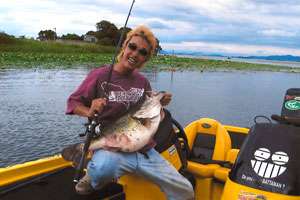
Ten-pound largemouths, 6-pound smallmouths, 5-pound spotted bass — trophies?
Californians, Texans and Floridians make every cast with the knowledge that it might produce a double-digit largemouth. Anglers on Dale Hollow in Kentucky and Tennessee, Lake Pardee in northern California and those who frequent Pickwick in Alabama or Lake Erie, know a 6-pound smallmouth could come at any time. Enthusiasts in California, Alabama and a few other states know that a 5-pound spotted bass lurks around every corner.
For some anglers, the thought of eclipsing those marks on their local fisheries may be nothing more than a pipe dream. While the standards above will likely remain the standards for judging what categorizes trophy bass on a national scale, anglers can take pride in catching much smaller specimens.
When we examine the world records of each of those three main species, a trophy bass (by most standards) tips the scales at around half the body weight of the largest specimens on record.
In the case of Manubu Kurita’s record tying 22.3106-pound largemouth, a 10-pounder would be roughly 45 percent of that specimen. For David Hayes’ 11.9375-pound smallmouth, a six-pounder would be just over 51-percent of that size. When comparing the size of a 5-pound spotted bass to Bryan Shishido’s record 10.2500-pound world record, the difference is also slightly higher than 51 percent.
That said, anglers across the country should look at the state in which they do their angling, and recognize the size differences in chasing trophy bass. For example, while the state record largemouth in Georgia is George Perry’s all-tackle world record (22-4), the state record in Wyoming is a 7-14. To compare these two catches is unfair.
The same can be said for smallmouth bass in Delaware, where the state record weighed 4.9688. And the smallest state record spotted bass was Virginia’s 3-10.
Giant bass can become an addiction that keeps anglers awake at night and drives them from a warm bed before dawn. Some sleep in their trucks to be the first person to get to the rental boats at small San Diego lakes, while others brave blizzard-like conditions to pursue huge bronzebacks.
The truth is big bass hunting is what we make of it. Everyone wants the chance at a truly giant bass, and some pay healthy sums of money to chase them at destinations across the country, even outside our borders.
The saying “a bass is a bass” is commonly used amongst tournament anglers to describe the seasonal migrations of bass on tournament lakes across the country, and it can apply to big bass as well. Whether you are an angler in pursuit of a 20-pound largemouth in California or an 8-pounder in Wyoming, the pursuit is similar.
The tactics of trophy anglers may be used (often with minor modifications) almost anywhere. After all, a big bass is a big bass, regardless of its pounds and ounces. Check out Bassmaster.com’s list of state records for the area you fish.

